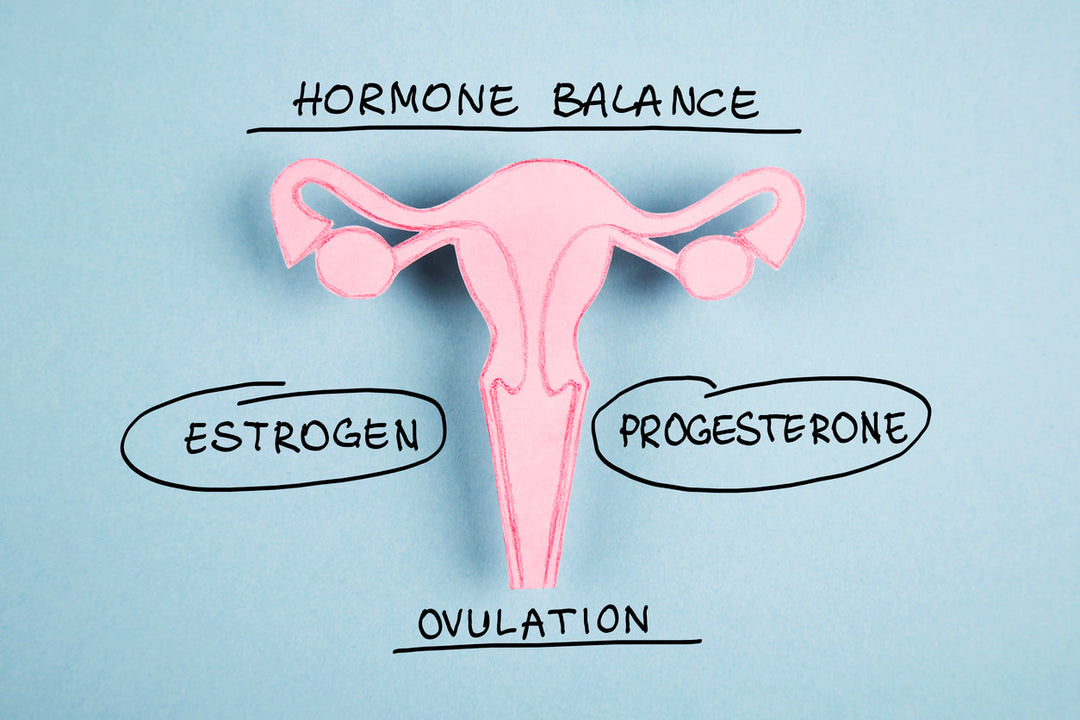Can Progesterone Cause Weight Gain During Perimenopause and Menopause?
Of the many questions and concerns that come up surrounding menopause, weight gain is probably the biggest. More specifically, you may wonder: does progesterone cause weight gain during this phase? Could it be a hormonal imbalance or something else? If you're navigating perimenopause or menopause and wondering if progesterone is making it harder to manage your weight, you're not alone. Let’s break down the science behind it, explore what research says, and discuss ways to maintain a healthy weight during menopause.
What exactly does progesterone do?
Before we dive into the weight gain question, let’s first understand what progesterone does in the body. Progesterone is a hormone that plays a key role in regulating the menstrual cycle and preparing the body for pregnancy. It helps balance estrogen, supports healthy sleep, and influences mood. However, as women approach menopause, progesterone levels naturally decline, contributing to symptoms like mood swings, sleep disturbances, and hot flashes.
To manage these symptoms, some women turn to hormone replacement therapy (HRT), which may include progesterone. But does taking progesterone lead to weight gain? The answer isn’t as simple as yes or no.
The research: does progesterone lead to weight gain?
There’s a lot of conflicting information about hormone therapy and weight changes. Some women report feeling bloated or gaining a few pounds, while others notice no difference. Let’s look at what scientific studies say.
Study 1: progesterone and metabolism
A study published in the Journal of Clinical Endocrinology & Metabolism (2012) explored how progesterone influences metabolism in postmenopausal women. Researchers found that while progesterone itself didn’t directly cause weight gain, it had an impact on fat distribution. Some women experienced increased fat storage, especially in the abdominal area, but this was influenced by other factors such as diet, genetics, and lifestyle habits.
Study 2: estrogen-progesterone therapy and body composition
Another study published in Menopause: The Journal of The North American Menopause Society in 2016 examined how estrogen-progesterone therapy affects body composition. The study concluded that while combined hormone therapy didn’t significantly increase body weight, some women did experience mild fluid retention and bloating. This could lead to a temporary sensation of weight gain, but it wasn’t necessarily due to fat accumulation.
So why do some women gain weight during menopause?
Even though progesterone itself isn’t a direct cause of weight gain, many women find that maintaining their weight becomes more challenging during menopause. Here are a few reasons why:
-
Slower Metabolism – As we age, our metabolism naturally slows down, making it easier to gain weight and harder to lose it.
-
Hormonal Changes – The drop in estrogen levels can lead to fat being stored differently, often in the abdominal area.
-
Decreased Muscle Mass – Aging leads to a natural loss of muscle, which lowers the body’s calorie-burning capacity.
-
Lifestyle Changes – Menopause can bring changes in activity levels, sleep quality, and stress, all of which can contribute to weight gain.
-
Fluid Retention – Some women taking progesterone therapy experience temporary bloating due to water retention, which may feel like weight gain but isn't the same as fat gain.
How to manage your weight during menopause
If you’re struggling with weight changes during menopause, there are plenty of steps you can take to maintain a healthy balance. Here are some practical tips:
1. Focus on a Nutrient-Dense Diet
Eating the right foods can make a big difference. Aim for a diet rich in whole foods, lean proteins, healthy fats, and fiber. Avoid processed foods, excess sugar, and refined carbs, which can contribute to weight gain and bloating.
2. Stay Active with Strength Training and Cardio
Exercise is essential for maintaining muscle mass and keeping your metabolism strong. Strength training is especially important, as it helps counteract the natural muscle loss that occurs with age. Combine it with cardio exercises like walking, swimming, or cycling to boost heart health and burn calories.
3. Get Enough Sleep
Poor sleep is linked to weight gain, especially during menopause when sleep disturbances are common. Establish a relaxing nighttime routine, limit caffeine in the afternoon, and avoid screens before bed to improve your sleep quality.
4. Manage Stress Levels
Menopause can be a stressful time, and high stress levels can lead to increased cortisol production, which promotes fat storage — especially around the midsection. Activities like yoga, meditation, and deep breathing exercises can help reduce stress and keep hormones balanced.
5. Stay Hydrated
Drinking plenty of water can help reduce bloating and support digestion. Sometimes, what feels like weight gain is actually just fluid retention, so staying hydrated can make a noticeable difference.
6. Consider Talking to Your Doctor
If you’re concerned about weight gain or hormone therapy, consult your healthcare provider. They can help you determine whether HRT is right for you and suggest personalized strategies for managing your weight.

The bottom line: does progesterone really cause weight gain?
The short answer? Not necessarily. While progesterone itself isn’t directly responsible for significant weight gain, it can contribute to fluid retention and fat redistribution in some women. However, factors like aging, metabolism, and lifestyle choices play a much bigger role in weight changes during menopause.
If you’re experiencing weight gain, focusing on a healthy diet, regular exercise, stress management, and proper hydration can go a long way in helping you maintain a healthy weight. And remember, every woman’s experience with menopause is unique — what works for one person may not work for another.
By understanding the factors at play, you can make informed choices and navigate menopause with confidence, feeling your best every step of the way.











